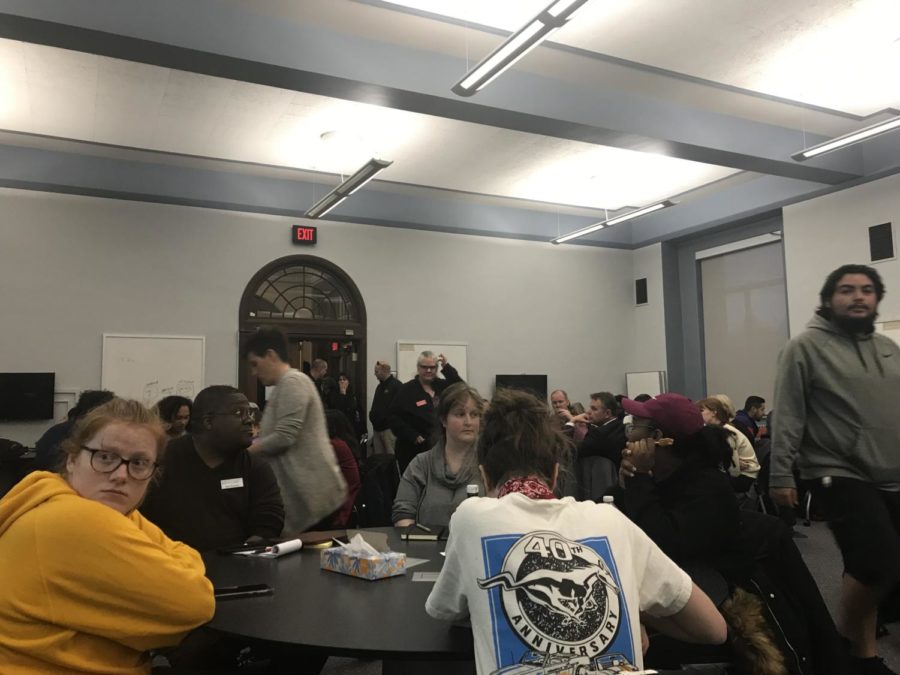Guest column: My habitual gender language is not an excuse
Iowa State students, faculty and staff gathered in Parks Library to hold a discussion about controversial issues on campus Nov. 4.
November 10, 2019
At the Campus Conversation last Monday in Parks Library, I heard the pain, the frustration, the need for action from all our students in the room who felt that Iowa State is not providing them a safe learning and living environment.
My heart hurts for these students, and as president of the Iowa State University Faculty Senate this year, I want to do something that is meaningful to make Iowa State a campus where all students feel safe to learn and to live. And I mean all students.
But my own inadequacies came quickly to the surface in a conversation following the meeting when I invited a student to provide me input about creating change on campus. During this brief conversation, I accidentally mis-gendered an acquaintance of theirs three times in the space of a minute.
I am grateful to the student for correcting me each time I misspoke. I apologized to them for creating the need to do so. It is exactly this kind of speaking out of habit — in my case a habit formed over nearly 60 years of speaking gender-binary English — that in part gives rise to the exhaustion some students, faculty and staff currently feel.
They say they are swimming upstream every day against a current of habit, not to mention even stronger currents of intolerance, bigotry and racism in their daily work and lives.
In the instance I mention above, I was genuinely not trying to be insensitive, intolerant or bigoted; I was speaking casually with a student, and my habitual gender language was voiced before I had given myself time to think. It is a reason, not an excuse. Not malicious, perhaps, but exhausting for the student nonetheless, and I saw it in their eyes — “more of the same” to them.
I am being educated by my students that even if my intent is benign, the impact of my words on them has a real and potentially damaging effect, and one that I might not immediately perceive. And while I work hard to make my failures few and far between, every failure creates a moment of stress for the recipient, and I know I can do better.
This one minute in which I failed to be the best leader I could be for the students who are entrusting their education as well as years of their lives to me as an Iowa State faculty member served as a wake-up call and a teaching moment that perhaps I can share through the Iowa State Daily.
As faculty we spend considerable effort and attention upon the content of our speaking — the knowledge we share with our students. But we must consider with every sentence, with every word, our impact as well.
Is what we are saying, even out of habit, causing a blockade to the ease with which our students learn from us? Or perhaps even their willingness to learn from us? What I heard from them at the Campus Conversation is that, indeed, it does.
Self-examination requires that we ask if we have, over a career or a lifetime, become habituated to language the impact of which is hurtful in our present day. Instances might involve views of gender, race, ethnicity and identity; or language we intend as motivational, but which is heard as bullying; or other concerns that have become habitual for us from a past time when, though the underlying issues and oppression existed, the culture treated the oppression differently.
Our language may seem benign to us, but because our past experiences are narrower than the experiences of our audience, they create stress and exhaustion, if not pain and suffering.
In one minute yesterday I understood, personally, a little more clearly the need, the pain and the exhaustion some students face daily at Iowa State, and I pledge to be better.
I am grateful that I live in a country where the ideal is that all people are equal and free to live as they choose. We all know the reality does not yet align with the ideal. As I work to make my own actions and language support this ideal in ever greater detail, I hope most of all that students will feel safe to educate me in return for the education I provide them.







